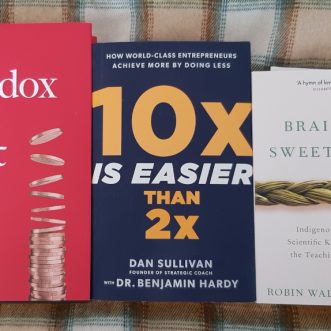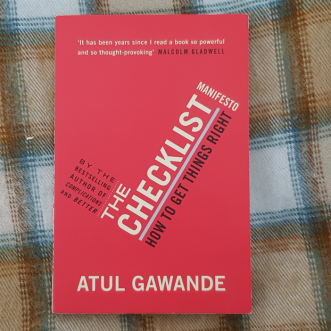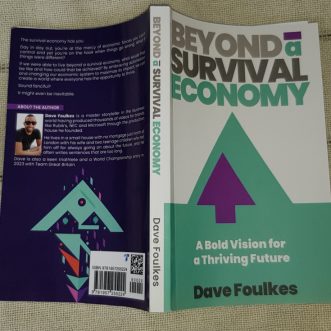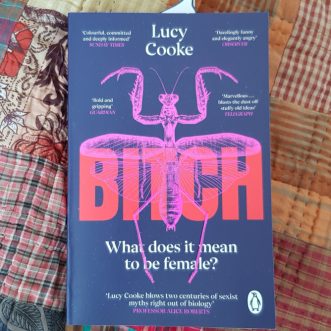
Masters and management
There was a time when being a Master was to be an expert. To have experience. To have care for … Read More “Masters and management”

There was a time when being a Master was to be an expert. To have experience. To have care for … Read More “Masters and management”

“10 times is easier than 2 times” by Dan Sullivan and Dr Benjamin Hardy is by no means a how-to book, but it is a very useful book.
I’ve heard of the basic premise before – that radical change is paradoxically easier than incremental change, because it makes you think completely outside the box about how you might get there. For me, that intersects nicely with Category Pirates thinking, where you stop competing with everyone else in a particular category, and create a completely new one for yourself.
What was new for me was the idea of applying this thinking repeatedly in your life and in your business. And not just you. Your team too. Which reminded me of Derek Sivers’ story of recruiting his own replacement for a job, before he announced his intention to leave.
This might seem a long way from my idea of a Customer Experience Score. A well-documented and well-rehearsed ‘what we do round here’.
It isn’t.
Creating the Customer Experience Score for your business unlocks the first 10x, because it reminds you what your business is here to do; it forces you to think about Roles (which goes even further than ‘who not how’), and it makes you think completely differently about how you manage it.
It enables you to Disappear as a Boss. It makes you create a self-managing business.
Once you’ve done that, it’s easier to 10x through rapid growth (say 40%) per year, or by creating 10 instances of the business (by franchising, for example).
And now you have a Customer Experience Score written down it becomes easier to 10x again.
All you have to do, is ask at every Group Practice: ‘How do we make this 10x better?‘
The Score will show you what to change and how. Which makes doing the change even easier.
Discipline really does make Daring possible.
The hard part is daring in the first place.

I made the most of this Bank Holiday weekend, and got some reading in:
Left to right: “The Paradox of Debt” by Richard Vague; “10 times is easier than 2 times” by Dan Sullivan and Dr Benjamin Hardy and “Braiding Sweetgrass” by Robin Wall Kimmerer. I haven’t finished this one yet, it needs a slow, meditative read.
They are 3 very different books, all highly recommended, and despite very different content, all share a common theme:
When you watch the wrong things, the wrong things happen.
And the right things to watch have been there all along.
Discipline makes Daring possible.

I’m slowly working my way through “Braiding Sweetgrass” by Robin Wall Kimmerer. Enjoying a story or two before I go to sleep is a great way to unwind and bring myself back to my proper place in the world.
Two things stood out from last night’s reading:
The Haudenosaunee Thanksgiving Address, or ‘the words that come before all else’, the words that begin every meeting, every negotiation, every celebration. Here’s a video of it, recorded for Earth Day.
and
“In a consumer society, contentment is a radical proposition.”
What would happen if I read that Address at the start of every day?
What would happen if we all did? Whenever we gather?
Something good I think.
Which makes it well worth sharing.

Christmas, 2014. I was listening to The Reith Lectures on Radio 4.
As usual, I hadn’t taken much notice of who was behind what I was listening to (I didn’t find out who played my favourite ever dance record until 30 years later). Then the speaker said something that galvanised me.
“Discipline makes Daring possible”.
After that I had to follow up on it.
The lecture was the second of a series on “The Future of Medicine”. The speaker was Dr Atul Gawande and the episode title was “The Century of the System”.
It “tells the story of how a little-known hospital in Austria managed to develop a complex yet highly effective system for dealing with victims of drowning.” – specifically in freezing water. A system that could be triggered by the receptionist.
The story came from Gawande’s book, “The Checklist Manifesto“. I tracked down a copy, bought it and devoured it in one sitting.
I thoroughly recommend it. Not just because it shows how something as simple as a checklist can save millions of lives, also because it shows how resistant ‘professionals’ are to any kind of systemisation.
Which fed nicely into my fascination with finding that fine balance between systems and humans that makes for consistently rich and evolving customer experiences, as well as consistently rich and evolving employee experiences.
If discipline is what makes daring possible, how little of it can you get away with?
How much daring can it enable?
I don’t know.
But I’m still enjoying finding out.

Today, I’m recommending Jason Fried’s blog.
As I’m sure you know, Jason wrote “It doesn’t have to be crazy at work“, a book well worth reading if you haven’t already.
Jason writes from the perspective of a business that is ‘big enough’, doesn’t need to be bigger, and is primarily a vehicle for improving the lives of its customers and employees.
Nowadays that’s quite the radical view, and it gives him a very different perspective on all the things businesses do, or are told they should do which is really refreshing and always makes me think.
If you’d like an even more radical perspective on what business could be, I also recommend Ari’s Top 5 by Ari Weinzweig, co-founder of the Zingerman’s Community of Businesses.
And if you’d like to create your own, more rounded perspective on business and it’s place in the world, I recommend the Wolf Tool from Bev Costoya.
Discipline makes Daring possible.

Blogs and books to read, people to follow, ideas to think about, actions to take.
My first recommendation this week is a blog “Funding the Future” by Professor Richard Murphy.
One of todays posts is chilling, which is why I am recommending it.
Richard pulls no punches:
“The threat created by climate change is now bigger than that which was created by Covid.
It is bigger than the threat created by the global financial crisis in 2008.
It is also likely that the threat is now at least as big as that created by the Second World War because as many people as then are now at risk from democidal governments.”
I don’t always agree with him, but his posts always make me think about how things could be different.
The first step to changing things is to talk about how they are, how they could be, and how we could help them change in a direction that works for all of us.
The more of us that do that, the better, because we need to move fast.

As you know, I like a book that takes a different perspective, that opens up new possibilities, that offers a different mental model for how the world could be.
“Beyond a Survival Economy” by David Foulkes is one of those books.
I haven’t finished it yet, and I’m not going to save you the job of reading it, because I really think you should, but there was one quote that stuck in my mind as I read it yesterday:
“Payment is always forward oriented…when you are buying something, you are ordering its continued production and sale.” Götz Werner
That is how we as consumers continually re-create the world we currently inhabit.
Which means that one of the ways to create a different kind of world, is to buy it into existence.
To look behind the marketing and decide whether the world this brand is actually creating is what we want for our seventh-generation grandchildren.
And if it isn’t look for something else, or do without.
To put our money where our mouth is.
Not because this will change the world on its own, it won’t.
But we can use it as one way in to changing the system, while we tackle it from another direction elsewhere.
Discipline makes Daring possible.

I finished “The Uncertainty Mindset” this morning. Unike many management books, it’s taken me a while to finish because the book is dense with ideas and insights, so I have had to rest between reads.
I thoroughly recommend it, especially for those who wish to disrupt with their business.
In the high-end, ultra-innovative world of fine dining of the book, teams of innovators repeatedly dance with chaos, pushing themselves into some new, unknown situation (moving the restaurant to new country; organising a conference; organising food relief in hurrican-struck islands) inducing a feeling of desperation as they scramble to deliver on a promise that will be at once utterly new and utterly familiar to their clientele. Each time they dance they learn anew that they will succeed, even if they don’t yet know how. And they do succeed. Spectacularly. Then they rest, allowing themselves time to recover before they go again, on an even bigger challenge.
They can do this because they are specifically R&D teams. The day-to-day of a restaurant can’t run like this. The teams running the restaurants have a different challenge with it’s own rhythm.
What if you’re not a restaurant chain? What if you aren’t R&D? What if you simply want to evolve continuously, not necessarily radically, in response to the world around your business, through the lens of your customers? What can be learned from this approach?
It’s this aspect that I want to pursue – that dance between order and chaos, between predictbility and uncertainty that makes life so interesting.
So I’ll be reading it again, taking notes, and translating it into my own terms, so I can share it with you.
Discipline makes Daring possible.

I’ve been reading this book over the weekend, and I have found it absolutely shocking.
Not for any of the revelations around the females of various species, but for the fact that it’s taken about 100 years since Darwin for anyone to actually start looking at them! Even longer for findings to be taken seriously.
Only 56 years ago, Desmond Morris could opine that the reason women have breasts is because men missed the ‘fleshy hemispheres’ of their bottoms once they switched to face-to-face sex. And this is science.
Your prospects don’t know what you know, they don’t necessarily believe everything you believe, so they make assumptions.
Your team don’t know what you know, they don’t necesarily believe everything you believe, so they make assumptions.
And so do you.
Most of us are not scientists, we don’t have time to run meticulous experiments, but we could radically improve our understanding of each other by regularly asking 1 simple question:
What is it be like to be them?
Followed up by a bit of finding out.
Discipline makes Daring possible.